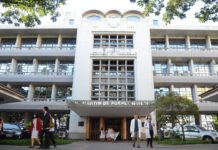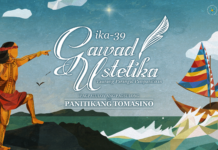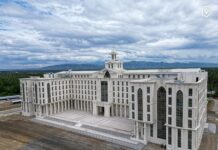Text of the acceptance speech delivered by the late former president Corazon C. Aquino during the conferment of the Degree of Doctor of Laws, honoris causa, and the Golden Cross award on February 9, 1987 at the UST Chapel.
THIS IS indeed an honor and a pleasure I have long looked forward to – for on a similar occasion honoring St. Thomas More, Rev. Fr. Frederick Fermin enlightened us on the meaning of reconciliation.
My husband returned for the sake of reconciliation and was killed for his pains. It was important that I understood the idea well, for the burden of completing his work had fallen on my shoulders. The alternative to reconciliation was confrontation. The price of that in blood and destruction was unacceptable. Ninoy’s death demonstrated what the dictatorship was prepared to do: on a larger scale, to defeat the struggle for liberation. Quoting Gandhi, Ninoy had said that the willing sacrifice of the innocent was the most powerful answer to insolent tyranny yet devised by man. His murder was tyranny’s rejoinder. Fr. Fermin wondered if that ended the discussion, if the death of Ninoy had not exhausted the non-violent campaign for freedom. The first, he said, is faith in God and in non-violence. The second is adherance to justice as the sole motive for action. The third is a willingness to endure suffering, and the fourth, to do it without rancor. He asked how much one could expect of the people’s commitment to justice in a consumer society like ours. The path of reconciliation demanded sacrifice and therefore a measure of detachment from material possessions. The vast majority of Filipinos was poor and patient in suffering. But this was not by choice. It was an affliction.
I think that it was with pleasure that Fr. Fermin found all his doubts answered two years after he posted them. They were not answered by intellectual arguments. They were answered by history – by the collective action of the Filipino people in the campaign, the election, and the revolution of 1986. It is here that we find the spirit of Thomas More added to the prescriptions of Gandhi. As you know, More looked for every way to avoid a direct confrontation with the state, even on a matter of conscience. More did not think that man should seek martyrdom if reason could find another way by which they could be true to their conscience and achieve their aim. In the play “A Man for All Seasons,” More says “God made the angels to show His splendor, as He made animals for innocence, and plants for their simplicity. But man He made to serve him wittily in the tangle of his mind. If He suffers us to fall to such a case that there is no escaping, then we may stand to our tackle as best we can, and yes, we may clamor like champions, if we have the spittle for it.” And no doubt it delights God to see splendor where He only looked for complexity. But it is God’s part and not our own to bring ourselves to that extremity.
We knew the overwhelming power of the government we were opposing. We knew its tremendous capacity and resources for mischief in defeating justice and distorting the prowess for democracy. If the facts were allowed to speak for themselves, they argued conclusively for confrontation. But in the spirit of More, we looked for an opening that would lead us to freedom without having to pay the unacceptable price of national martyrdom. The dictator himself gave us the opening when he called for a snap election. We took up his challenge. We accepted an unconstitutional law passed by an unconstitutional government, as a step towards constitutional democracy. We knew he intended it to be a mockery, but we knew also, on the authority of the bible, that the mouth of a fool invites ruin.
A fool had issued an invitation. With complete faith in God, and His wisdom and providence, we entered the unequal contest. We knew what it would entail our people’s integrity against his corruption, their native wisdom against his clever lies, their courage against his threats, and always that love which God enjoins and the election, when our people offered their lives to protect the ballot, to the revolution where they offered their lives to vindicate their victory, our people demonstrated all the virtues of which we had despaired.
Here was faith in God and commitment to non-violence. Here was justice as the single motive of innumerable selfless acts. Here was perseverance and suffering and patience in the face of revolution. And always that love, which in the end, melted the stern resolve of the forces of tyranny, and made them join us in our common liberation.
As you know, the story does not end there. The enemies of our freedom continued with their attempts to return us to our chains. Once more they challenged us to put our democracy to a test at the polls. A test they then tried to subvert by formenting several disorders. Once more our people rose to the challenge, and in a tremendous and unprecedented vote, declared the permanent commitment of this nation to democracy.
Of course, not all of Fr. Fermin’s and our concerns are answered by democracy alone. We have achieved only half of our total liberation. Only one-half has been freed – the other is still shackled to poverty, social injustice, and underdevelopment. But can the task be harder than when we had both hands chained?
In the past year, the Filipino people consistently chose the longer and more difficult path of non-violence, non-confrontation, and democracy to achieve their aims. In this, they show a consistent fidelity to the teachings of Gandhi and the spirit of St. Thomas More. The power of the people which brought us democracy and found a new constitution must certainly bring others progress and justice for which we won.
I thank you for the honor you have conferred to me.










